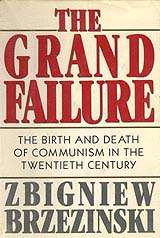
Brzezinksi's 'Grand Failure'
|
This review first appeared in the San Diego Evening Tribune in 1989.
As Soviet Premier Mikhail Gorbachev's late-1980s policies of glasnost and perestroika are stirring interest in the Soviet Union and all things Soviet, an in-depth analysis of the proper historical (both domestic and international) of this period would have been quite useful. Both casual and serious followers of the international political scene would have found a knowledgeable text by a former Cabinet-level official nearly indispensable.
But "The Grand Failure," by Zbigniew Brzezinski (national security adviser under President Carter) lives up, or rather down, to its own title. There are two main reasons for the failure of "Failure": Brzezinski's unwillingness or inability to analyze beyond the most obvious levels, and an annoying habit of repeating the same themes and conclusions throughout the first half of the book.
Subtitled "The Birth and Death of Communism in the Twentieth Century," "The Grand Failure" purports to be a comprehensive overview of Marxism-Leninism-Stalinism-Maoism. Yet, very little of the book is focused on the history of Soviet Russia before Gorbachev's era. Instead, most of "The Grand Failure" is taken up with superficial analyses of Gorbachev's policies (packaged neatly to support Brzezinksi's central theses, i.e., the impending death rattle of communism) or the recent economic policies of China.
In the first three (of six) sections, Brzezinski argues again and again that Gorbachev's policies of economic decentralization will result in loosening of social control and, eventually, political pluralism that will topple the single-party system.
Further, and most interesting of his arguments, Brzezinski states that Gorbachev is limited in how far he can criticize Stalin to justify glasnost without discrediting the Leninist base that represents the bedrock of his right to rule. This argument is, from all accounts, original, and seemingly worthy of further, and deeper, study. But instead we get only broader explanations of the same political and social phenomena.
For instance, Chapter One ("The Leninist Legacy") concludes by arguing that Gorbachev's recent attacks on Stalin's rule lead, inevitably, to a renunciation of Leninism, for it was in Lenin's system that Stalin succeeded so well. Chapter Two ("The Stalinist Catastrophe") concludes with the same argument ("But the roots of the catastrophic legacy of Stalin go back to Lenin – to his twin legacies of the dogmatic party and of the terroristic secret police"), and Chapter Four ("The Paradox of Reform") repeats it once again ("To truly break with the past and to unleash social creativity, the Leninist legacy at some point will have to be confronted").
Brzezinski probably has a strong understanding of the subject matter, but is a poor writer, incapable of constructing a strong, well-argued thesis. In discussing the situation in Poland, where social and political unrest has been active over the last decade, Brzezinski gets carried away and makes bold statements with no supporting evidence: "The ruling party, by taking refuge in the slogan 'socialist pluralism,' acknowledged that the days of the Leninist monopoly of power and of the Stalinist suppression of all political life were gone forever."
Forever? Similar hopes were raised under Krushchev a quarter century ago – before the Czechoslovakian uprising was smashed by tanks and machine guns. To make the assumption that current optimism and political freedom are a guarantee of eternal salvation is illogical, especially given the historical setting of the events Brzezinski is describing.
In the fourth section of the book, Brzezinski avoids the thematic repetition and grandiose claims and gives a thoughtful, if not terribly enlightening, analysis of recent economic reforms in China. The fifth section argues that the international communist movement has lost the ideological momentum it had in the 1950s and '60s, and Brzezinski gives a believable and logical explanation of this situation as well.
In the last section, "The Agony of Communism," Brzezinski, without tying up any of the loose ends mentioned above, argues that communism is going through a four-part retreat to a system of nationalistic authoritarianism, with a final destination of post-communist pluralism. But he does not offer a believable scenario in which, short of a revolution of the type that brought the Bolsheviks to power, a dictatorial system of one-party rule might develop into a democracy.
By his own admission (in the chapter "Future Prospects"), this is unlikely to happen: "Successful pluralization of the Soviet Union is less likely than four alternative outcomes." These, according to the author, are an interminable period of protracted domestic crises, a return to the Brezhnev stagnation, a military or KGB coup, or the fragmentation of the Soviet Union along nationalistic lines.
The final conclusion of Brzezinski's grand failure is that "...democracy – and not communism – will dominate the twenty-first century." Which may or may not be true. Based on the disorganization of Brzezinski's book and the superficial evidence presented, though, an educated guess is simply impossible.

